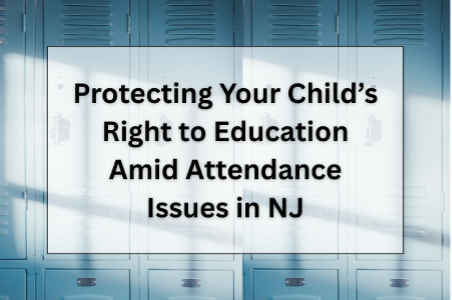If your child is struggling to attend school, especially if they have an IEP or 504 Plan, you may be wondering what your district is legally required to do. In New Jersey, the law requires early, structured steps to support students and address attendance issues. These procedures, outlined in N.J.A.C. 6A:16-7.6, are designed to help — not punish — children and families.
At Manes & Weinberg, LLC., we know how overwhelming this process can feel. This guide outlines the steps school districts must take to respond to growing attendance challenges and how to ensure your child’s rights are protected throughout.
School districts are legally required by policy to define an unexcused absence. However, the majority of school districts do not include medical reasons as a listed excused absence. This puts students with chronic health conditions in a precarious position, often resulting in loss of credit and placing their parents at risk for truancy charges and DCP&P reporting. What Should Happen After Four Cumulative Unexcused Absences?
At this early stage, the school is required to act. The district must:
- Notify the parent or guardian in writing;
- Investigate the underlying cause of the absences;
- Collaborate with the family to address barriers to attendance;
- Follow child protection protocols if abuse or neglect is suspected; and
- Involve law enforcement if the child’s safety is at risk
These early interventions are crucial. If they don’t happen or are handled improperly, they can cause your child to experience deeper academic and emotional setbacks.
What Should Happen When Unexcused Absences Reach 5-9 Days?
Once a student reaches five to nine cumulative unexcused absences, the district must make reasonable attempts to notify the parents of each unexcused absence prior to the start of the following school day and determine the cause of the unexcused absence. Additionally, the district must assess the appropriateness of prior interventions and implement a formal action plan. This plan may include:
- Health, academic, or behavioral assessments;
- Referral to the Intervention and Referral Services (I&RS) team;
- Temporary alternate placements; Involvement of community-based services; and/or
- Potential court referrals, if necessary.
The school must involve the family in developing this plan. If you’re not included — or the plan doesn’t reflect your child’s needs — you have the right to ask questions and request changes.
Is Your Child Being Marked Truant? (10+ Unexcused Absences)
Once a student reaches ten or more unexcused absences, New Jersey law classifies them as truant. At this point, the school district may:
- Refer the case to the municipal court
- Continue or revise the action plan
- Involve child welfare or additional support agencies
Under N.J.S.A. 18A:38-28 through 31, truancy cases can lead to court involvement. If your child is classified as truant and the district has not followed the earlier required steps, you may have grounds to challenge the process.
Students with IEPs or 504 Plans: Protecting FAPE
If your child has an Individualized Education Program (IEP) or 504 Plan, the district must align all attendance-related interventions with those plans. That includes:
- Following the mandates of the Individuals with Disabilities Education Act (IDEA)and Section 504 of the Rehabilitation Act of 1973;
- Adhering to healthcare plans tied to disabilities or chronic conditions; and
- Holding IEP meetings when attendance problems relate to academic, social/emotional, behavioral, and/or health challenges.
When a child with a disability is missing school, the district must evaluate whether the absences are related to unmet educational, social/emotional, behavioral, and/or medical needs. If so, the school is legally obligated to revise the IEP or 504 Plan to ensure the child continues receiving a free and appropriate public education (FAPE) and access to instruction. Ignoring attendance-related struggles — especially when they’re tied to anxiety, health conditions, or lack of services — can result in a denial of FAPE.
Additional accommodations may include a delayed start date, modifying class schedules to have electives take place in the morning, home instruction by an in-person instructor or virtual instructor, extra time on assignments, and/or a reduction of assignments. If your school is threatening truancy action without addressing your child’s individualized support needs, you have legal grounds to intervene.
What Are Districts Required to Do Behind the Scenes?
In addition to addressing individual cases, every New Jersey school district is responsible for:
- Developing and enforcing a district-wide attendance policy;
- Maintaining accurate, up-to-date attendance records; and
- Reporting chronic absenteeism and truancy to the state
These records are important. Documentation can help determine whether the district followed its legal obligations if legal intervention becomes necessary.
Parents and Guardians, You Don’t Have to Navigate This Alone
New Jersey law makes it clear that schools must intervene early and work with families. Yet, too often, families are left out of critical decisions, or students with disabilities are penalized for issues tied to unmet needs.
At Manes & Weinberg, LLC., we help parents and guardians understand their rights and ensure schools comply with the law. Whether you’re concerned about early attendance issues or facing truancy court, we’re here to advocate for your child or those in your care.
If you have questions about your child’s attendance or believe your school district is not following required procedures, feel free to contact our office. You deserve clarity, support, and a team that knows how to protect your child’s right to education.
____________________________________________________________________________
Disclaimer: The information contained herein is provided for informational purposes only. Nothing herein is intended as legal advice and should not be construed as such, nor does it create or constitute an attorney-client relationship between Manes & Weinberg, LLC. and the user. Consult your attorney for any specific legal advice.


